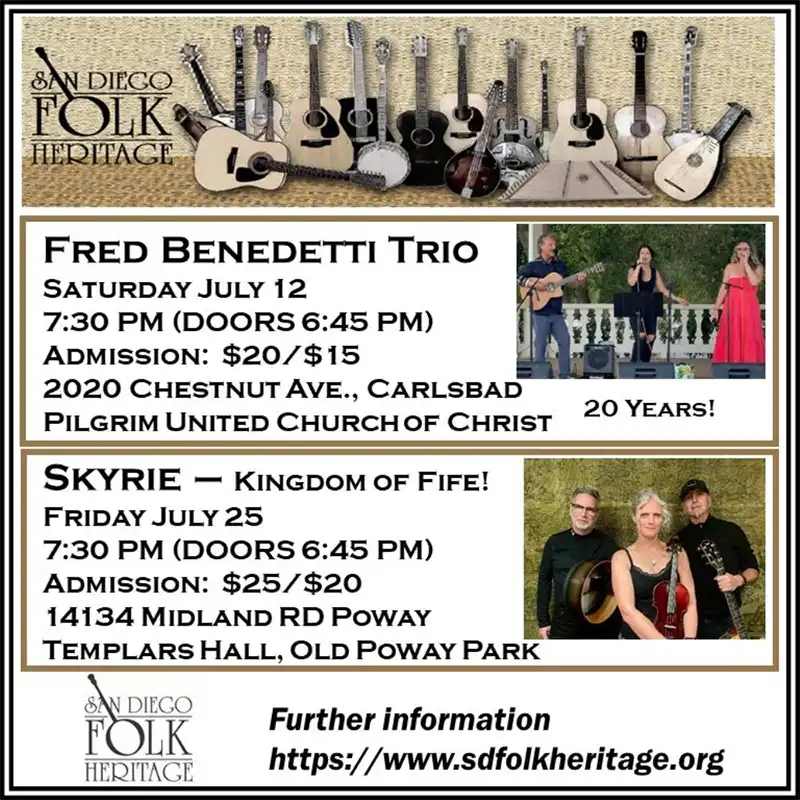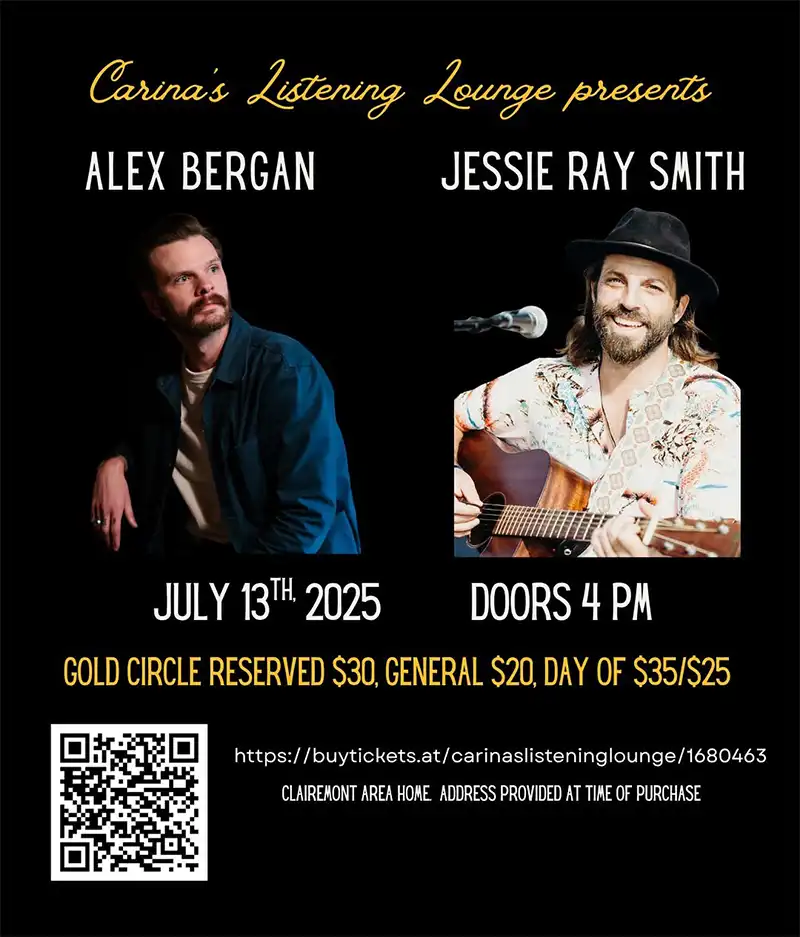Cover Story
Billy Watson: Purveyor of Musical Curiosities
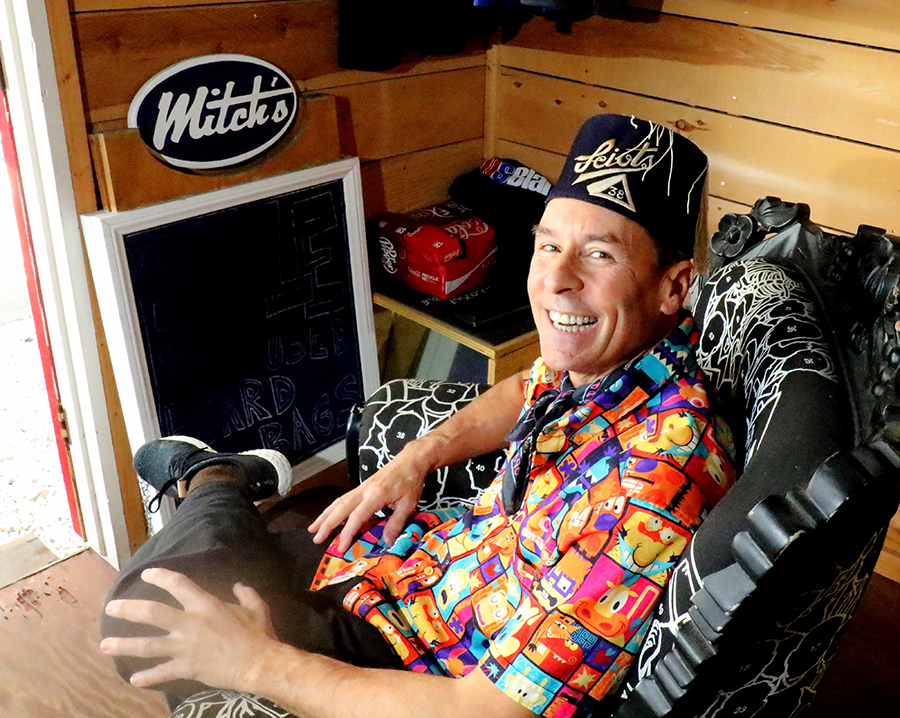
Billy Watson. Photo by Dennis Andersen.
I’ve been friends with Billy Watson for 30 years and have been fortunate enough to have had him in my own band, the Mississippi Mudsharks. I’ve also enjoyed playing in many different combinations of his rotating band of merriment, the International Silver String Submarine Band over all of these years. We grew up in the San Diego blues scene together, and from the early days to now I’ve always marveled at Billy’s talents as a harmonica player, songwriter, and front man.
To me, Billy as a blues musician is an original and a musician who is brave enough to play outside the lines and set himself apart from the multitude of blues bands that seem to follow a formula of “how to be a blues band.” Yet he also has great knowledge and respect of the music, the musicians, and the traditions. If you’ve witnessed a Billy Watson performance, you know what I mean. If you haven’t, after reading this interview you’ll understand the title. If he had a little shop, the plaque out front would read, “William T. Watson IV, Purveyor of Musical Curiosities”.
SCOTT: Let’s start at the beginning. Who inspired you to pick up the harmonica? Who was your biggest influence as a young musician? Who, or what drew you to the blues?
BILLY: My cousin, Brian Hanlon, gave me a harmonica when I was 15 and said, “Try this out. I think you have an aptitude for it.”
SCOTT: What made him think that?
BILLY: We were sitting around with some harmonicas, and Brian and his brother Allan played in nightclubs back in New Jersey as a duo. They would just play different songs and I was monkeying around with one of them and he said, “Here, take these two,” and I had two of them for the longest time. He turned me on to Sonny Boy Williamson II, and that was it. I was kind of hooked on blues.
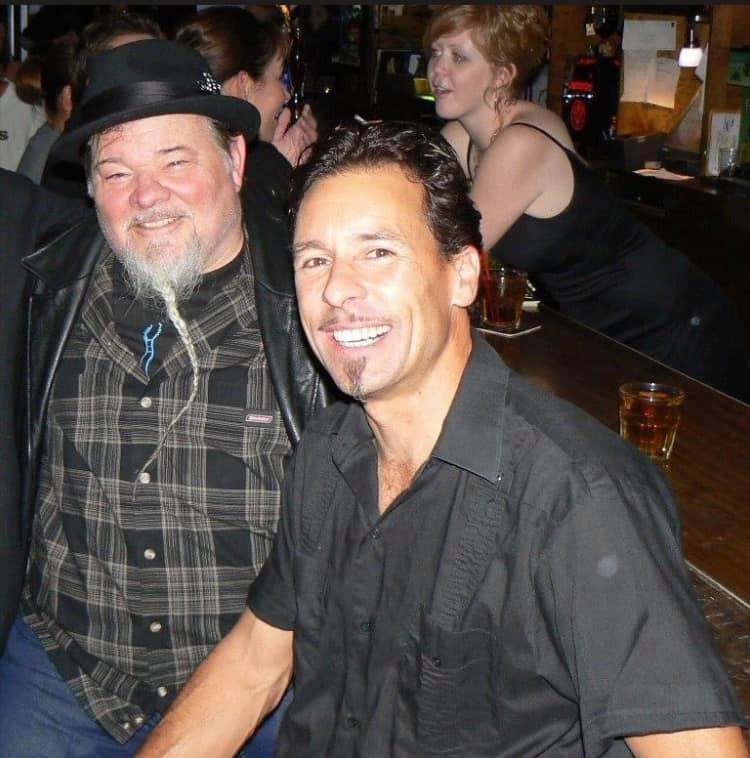
Billy with James Harmon.
The first guy I saw that really made me go, “This is for me,” was Rick Estrin of Little Charlie & the Nightcats. I got to meet James Harman, Charlie Musselwhite, Rod Piazza, and even Kim Wilson long before I ever got close to having a conversation with Rick. But what was cool about Rick was he was funny, and he was fronting the whole band with the harp. I had never seen that. I got to meet these guys at the Belly Up Tavern in Solana Beach after I moved here from New Jersey.
The first guy I actually talked to was Charlie Musselwhite, and he told me which harmonicas to use, turned me on to Lee Oscar, and turned me on to a harp mic builder. I actually got the guts to go backstage one time at a James Harman show and ask if I could sit in, and for some strange reason he was totally nice to me; he explained to me what the different harp mics were.
SCOTT: How did you find your way out to San Diego from New Jersey?
BILLY: My buddy Pat Hamilton was a civil engineer for the Navy, out here on a job with the Marines. He lived on Fern Glen in La Jolla with his wife, and he said, “Hey man, what are you doing?” I had just graduated from the school of visual arts and was lifeguarding…it was summer… and he said, “What are you doing in the fall? Come out here and try it for a couple months and see if you like it.” I came out and never went back!
SCOTT: When I first met you, you had come off the beach from a surf session into the Sand Bar in Carlsbad, I think on one of our (Mississippi Mudsharks) early Sunday shows. You blew everyone away with your playing even back then! How did you find your way into the San Diego blues community?
BILLY: Man, I just started hanging out. I have to be honest, it was really awkward because I would show up and just stand around with people who were talking and they didn’t know who I was, like Adam Sandler in a scene in a comedy. I would just walk up and they’d be talking and be like, “Who is this guy?”
I got to know people that way and remember meeting Nucci (Brian Cantrell) there as well as different guys at the “happening” jams like yours where anyone who was anyone would come in to play. I met everyone who was working in town like Ronnie Lane, Eric Lieberman, Steve Wilcox, Bruce Clark, Aristotle Georgio, Tomcat Courtney, Jonny Viau, Chillboy, and a bunch of others. Todd Stedman, Taryn Donath, and Kevin Williams were just starting out, too. Eric Lieberman got me my first gig at the Coyote Bar and Grill in Carlsbad. He let my band open for the Jukestompers in 1996.
I was in a band with Kevin Williams who trained me like a Marine Corp drill instructor and a guitar player named Phil, who encouraged me early on and showed me rudimentary chord changes. You recorded our first demo tape.
But the guy that was really great and was the most patient with me was Brad Karow. He was always encouraging and inviting, and he turned me onto a lot of blues. I met Tom Mahon through him, and the band they had with Chris James and Patrick Rynn called the Blue Four. These guys really knew and were playing authentic blues.
Billy Watson and Company at Gator by the Bay, 2022.
SCOTT: Before long, it seemed like you were playing with the best in San Diego and sharing stages with some big names, sometimes as a sideman, but then really fronting your own band. How did you come up with the concept of a rotating band, and how do you feel the chemistry works with so many combinations?
BILLY: I like to improvise stuff because that’s the way blues sounded to me in the first place, the way it was invented by the architects of the music. I would look at those album covers, and they would hire each other’s band members, too. The roadmap is there, everyone listens to it, there’s only three chords usually, maybe you throw in a fourth. You don’t want to screw up the band! (Laughs) Nathan James used to say, “Well, sometimes one chord is too much,” or something like that!
I felt like, if you had a band and someone got sick, or someone didn’t dig what you’re doing, or there was some drama, I just didn’t want drama in my art. I just felt like having a band; it’s like having a family. I’d rather have a family. The band has to be able to hang and have a good time. I never wanted hard feelings. No one is married to me, and I’m not married to them, you know?
SCOTT: You have always understood the “show” element of playing the blues. Tell us about the name “…and his International Silver String Submarine Band”. Many people our age get the reference, but there are many who don’t.
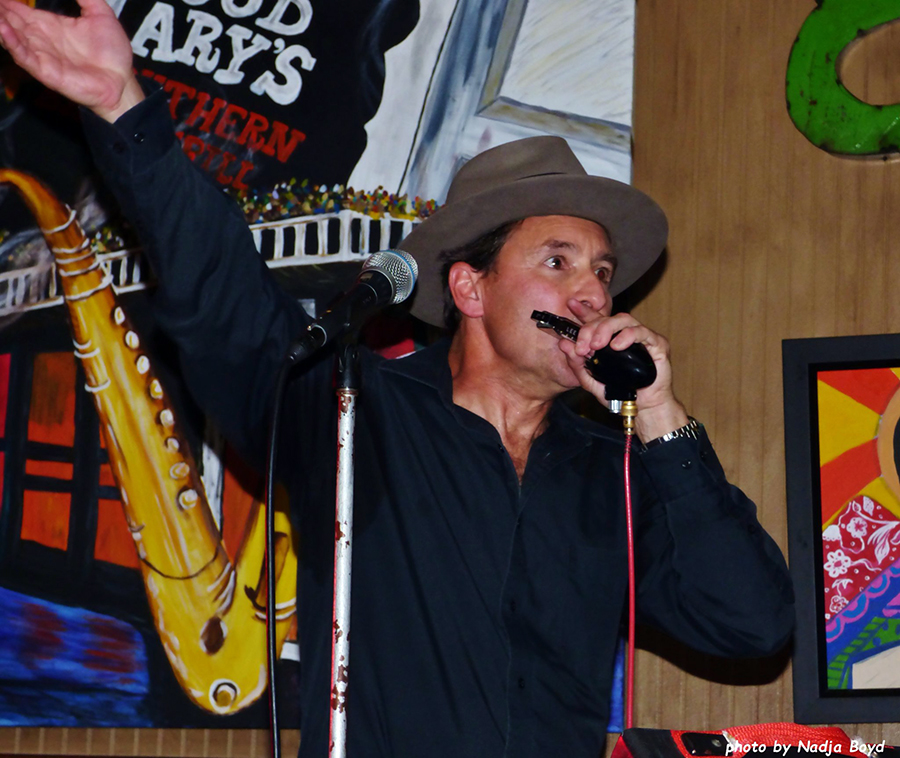
Billy at Proud Mary’s.
BILLY: Surprisingly, there are a lot of people, guys 20 years or more older than me, and they’re like, “What’s with the name?” It comes from the Little Rascals, the Hal Roach-produced shows from the 1930s, and I’d watch and re-watch them religiously. When you watch those episodes there’s usually a moral of the story at the end, and they make fun of everything that’s wrong in the world. The comedy is top notch but there’s always this camaraderie amongst the kids, and they’re always working with their hands, building their own stuff…their instruments, their cars, their little go-carts…whatever it was, it was crafty.
And the music in the background taught me about music, and I didn’t even know they were doing it! That music is some of the most complex and well-orchestrated music of that time, maybe even our time, and you listen to it and it’s genius! The background music to what they’re doing, the non-sense they’re getting into… is perfect. So, I learned about music and comedy through the Little Rascals.
The episode where that name is actually used was called “Mic Fright.” They crashed a radio talent show and they used this long winded name. People always say to me, “That name is too long,” but that’s the whole point! It’s supposed to be a goof on the name of bands with this ego thing behind it, trying to impress each other and make themselves sound bigger than they really are, and that’s what these kids did. They said, “We’re the International Silver String Submarine Band!” One guy says to another guy in a snooty voice, “You know those boys, don’t you?” and it’s all B.S.! And the other guy says back to him in a snooty voice, “Why, I’ve never heard of them.” (Laughs)
The whole episode shows everything musicians went through back then, and still go through to this f***ing day! It’s nuts, and it just influenced me so greatly. I watched that from age five until was, like, 15. They’re all classics, but “Mic Fright” is the funniest one as a musician, because you see these old tubes in the studio, and the sound man is getting abused when they keep hitting the microphones and causing his hat to blow off and equipment in the control room blow up, and they’re knocking over these ribbon mics. It’s chaos, yet they sound great! Every musician should see it!
So, that’s where I got the name. I just took the whole thing! Gram Parsons used it too, but he didn’t use the whole name. He just called it “the International Submarine Band.” But again, the long-winded name is a spoof on egotism and music, like phony-baloney marketing where bands are always trying to one-up each other, and it’s all B.S. (Laughs)
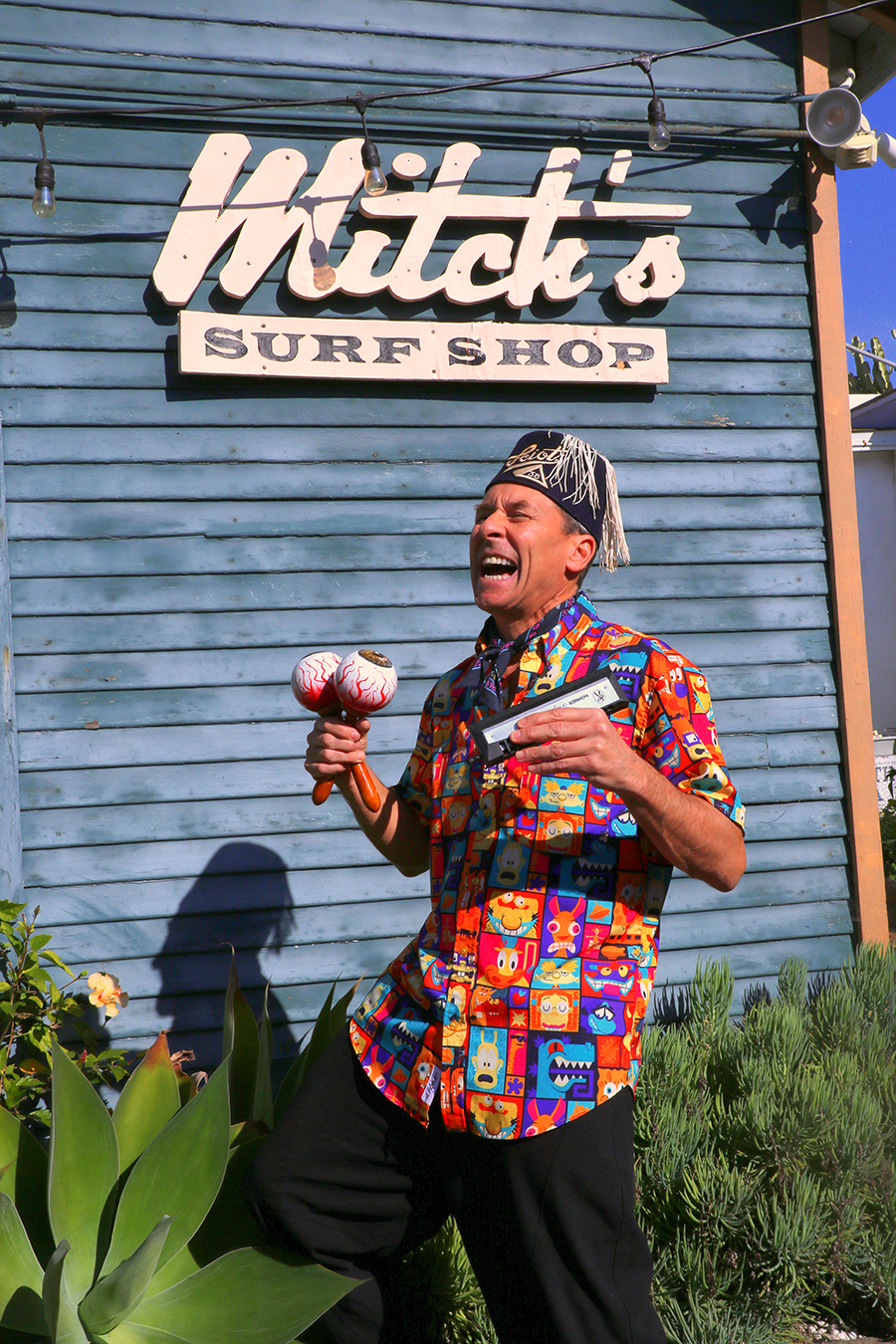
Photo by Dennis Andersen.
SCOTT: There’s always a “madcap” element in your performances. Who are your favorite comedians, and how did their influences find their way into your blues shows? I also want to compliment you on your masterful ability to balance the humor with taking the music seriously and being respectful of it.
BILLY: First of all, comedy and music don’t always work, like if I’m on a gig and I couldn’t get the guys I’d usually get, and there’s a lack of confidence and they just don’t know how to go along with it. I gotta tell ya, if the music’s not there, the comedy’s not going to be there.
Maybe I’m hired on a gig where I’m not familiar with the music, like with a country band, and they want me to get on the mic and say something to the crowd or front the band that night…it doesn’t work. You’re not confident enough. With music and comedy, you HAVE to be confident!
Comedy has a dark element behind it too. That’s what drives it. It’s funny, until it happens to you, as Dave Chapelle says. (Laughs) And that’s very true! You have to be witty and can’t be a dullard as a comedian. You have to be kind of up on things or at least sharp enough to understand what’s going on around you.
The guys I watched as comedians who were the coolest were, Laurel and Hardy, who shared the same sound stage as Hal Roach Studios; it was not uncommon to find Oliver Hardy off to the side coaching Spanky McFarland. You can see it in Spanky’s acting. Go back and watch…thank me later. (Laughs)
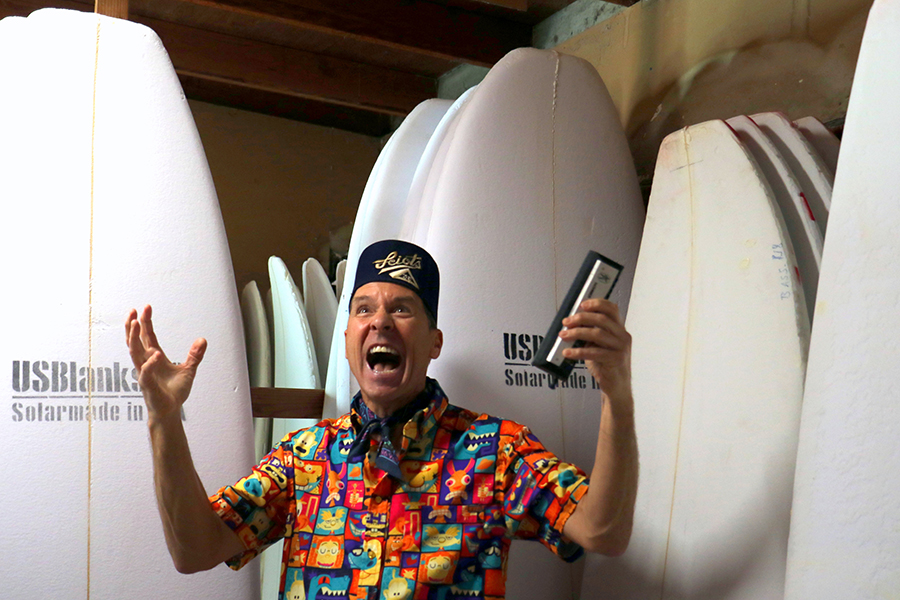
For a crazy, fun time, call Billy. Photo by Dennis Andersen.
But the guys who did it musically and comedically were the Marx Brothers. Chicolini and Harpo at the piano, Harpo played harp, and even Groucho played guitar. Those guys were amazing! Their comedy is like music, like a crescendo. When you watch a Marx Brothers film, it starts off with a little plot that’s kind of silly, and it just gets weirder and weirder, and it crescendos like an orchestra until the end is insane, mad zaniness! Just watch any of them and the humor just builds and builds.
It’s the same with the Three Stooges. By the end of any of their episodes it’s complete mayhem! Vaudevillian comedy, physical comedy, and music thy go hand in hand. They will not survive without each other.
A lot of blues guys, and I get it, would kind of criticize me for that because some of the comedy I was doing had nothing to do with the blues. It was almost, like, too surreal. We’d come out in giant blue boxes and a little puppet show, or we’d put funny masks on and dance around. I did all of that to get the attention of a totally non-responsive audience, as if doing CPR to them so they’d wake up and actually watch the band. Then, once we had their attention, I’d hit ‘em with a Little Walter song. Then I wouldn’t do any comedy for a while because they were all watching and enjoying themselves. That was the point.
SCOTT: I’ve been on plenty of shows with you and seen this work first hand. I’ve also seen photos and film of Howlin’ Wolf where he had a similar thing going on with his shows.
BILLY: He’s my hero. He’s my favorite, crawling around on the ground, licking his harmonica, and sometimes scaring the crap out of people because he was also a big guy! If I’m going to go home and listen to blues, it’s going to be Howlin’ Wolf. He’s a harp player too, and his harmonica playing is actually underrated. Nobody realizes it but Rice Miller, Sonny Boy Williamson II, taught him how to play harmonica. You can hear it in his playing! It’s very subtle but effective, not too much, not too little…and you can’t replicate it.
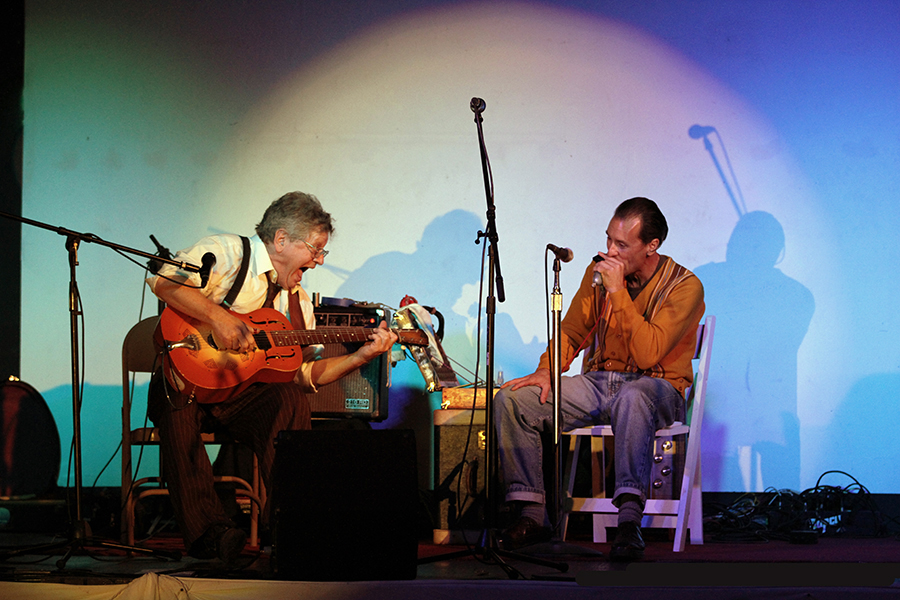
Billy and Robin Henkel. Photo by Dennis Andersen.
SCOTT: You have been a part of the San Diego blues scene for 30 years or so, and done thousands of shows. If you could pick one show as your absolute most memorable (good or bad), which would it be? How about your favorite show?
BILLY: Yeah, right 29 or 30 years, and right around 5,000 shows! I always felt we were a great opener for bigger concerts at places like the Belly Up. Fortunately, they really liked us there. We opened for Etta James three times, Dennis Quaid and the Sharks, Tommy Castro, Rod Piazza, James Harman, and more.
My favorite was one of those Etta James shows, with Adrian Demain and Jerry DeMink on guitars, Joey Jazdzewski on bass, and George Sluppick on drums. Jerry was running around in circles on stage, we had the masks on; Adrian played “Rumble” and I had two masks on, a Ronald Reagan mask over a Tor Johnson mask, and I’d rip off the Reagan mask at the end of the song and we’d go into a boogie, and the audience was dyin’ laughing! It was fantastic and definitely one of my most memorable and favorite shows, a double whammy! I lightened up the crowd and then Etta James, “The Queen,” came out and knocked it out of the park. That’s what I lived for, and that was my forte in the 1990s.
Another one of my absolute favorites was opening for Marcia Ball and Pinetop Perkins at the Belly Up, because that was a heavy blues night. We were only on stage for a short time, but we got to play with Pinetop Perkins! We really laid into that. I got to meet Dr. John that night, too.
SCOTT: You have recorded 11 CDs under your name, featuring some of the finest players out there. Being a guitar player myself, Junior Watson, Nathan James, Robbie Eason, Adrian Demain, and Robin Henkel stand out. George Sluppick, Phil Rowley, Paul Kimbarow, and Brad Karow on drums with Burt Newman, Chris Crepps and Joey Jazdzewski on bass…all amazing players! How do you feel the musicians you choose influence the songs they play on and the direction of the album?
BILLY: Robin adds a real genius touch to many songs. He’s like the secret sauce, laying down some cool slide parts behind say, Junior Watson. People really noticed that.
Some of these guys actually write the songs! They are like music directors. I’d rely on Nathan. And Adrian, man, one time we tried to do a country song and not one of us knew the changes, but Adrian was the one who could figure out the changes. James Harman walked in and said, “Well that’s Frosty the Snowman,” and Adrian just figured it out. (Laughs)
George Sluppick was the driving force behind my first CD. He introduced me to Justin Beach for engineering it and building my website. Even though we goofed around a lot, George was serious about the music. He really snapped me into shape. George is currently playing drums for Robert Cray!
Burt Newman is another guy. I could sing a bass line to Burt, and he’d play it note for note on the spot. That’s how great of a musician that guy is. He knows every song in the history of songs because of his involvement with high-end cover bands like the Mar Dels and Atomic Groove.
All the guys would bring their magic and I’d just melt into the songs. They would influence and inspire me. I was just the lightning rod.
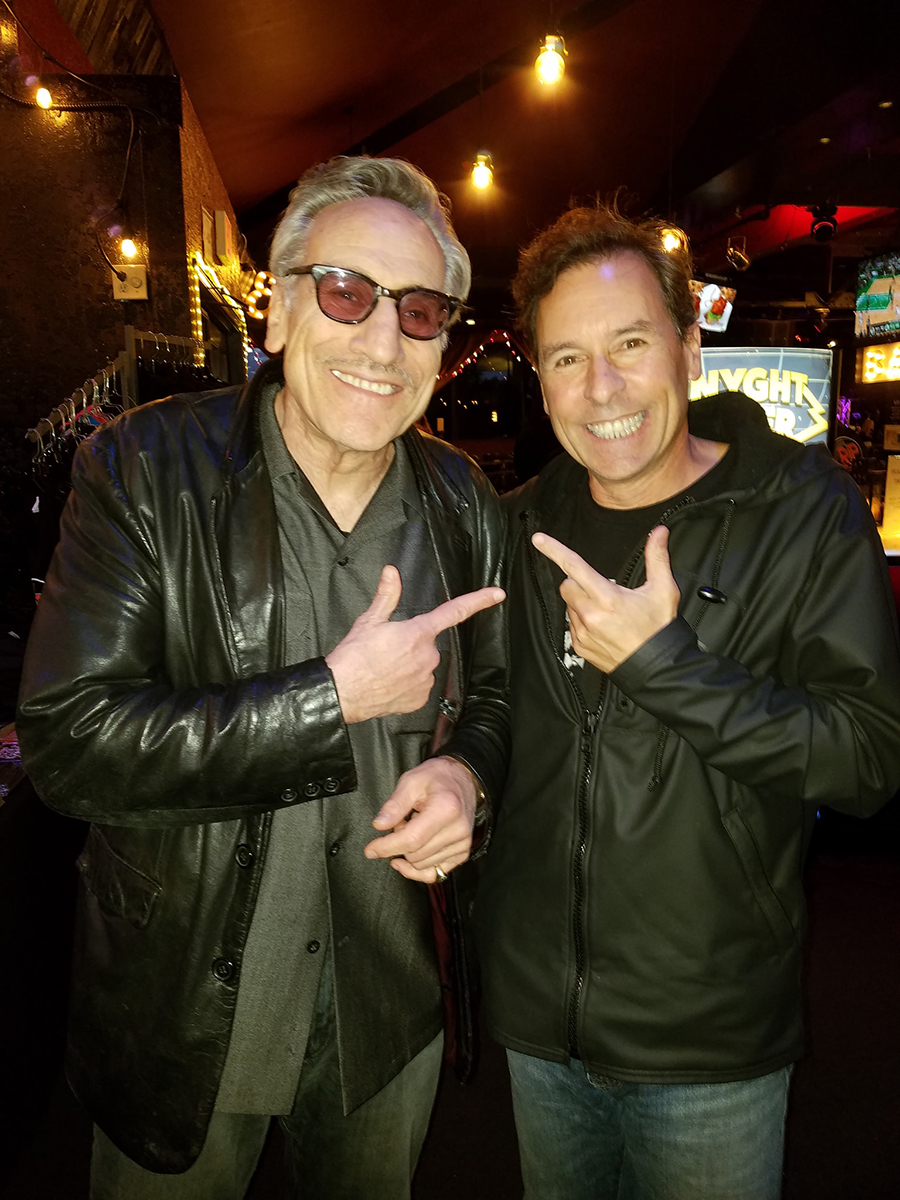
Billy with Rick Estrin.
SCOTT: Most of the songs on your CDs are originals. Do you have a process for writing, or does it just come naturally to you?
BILLY: Some of the songs I’d just write in the studio. I’d come up with a title and then just think of what the concept was supposed to be. Like “Tramp Stamp,” I’m gonna write about these chicks that have these things (tattoos) on their backs and are just hanging out on the beach. (Laughs)
“Could be a dolphin, devil, dragon, or even a corny peace sign. Maybe a tag from a knuckle dragger tellin’ everyone she’s mine. Get your tramp stamp on. Yeah, get your tramp stamp on. Get your tramp stamp on baby, it’s a trend all the girls are swingin’ to.”
But the one thing I’m really good at is I can sing every line, like the bass player’s line and the guitarist’s line, and I can play on the harmonica what I’m singing. So, that helps. I can tell each guy what I’m looking for as the basis. I’m not telling them what to play, just the idea.
Then you have a guy like Junior Watson who I’d feed a line to, and he’d say, “I’m not doing that. Just give me the key!” And he’d always come up with the right thing, like magic. (Laughs)
SCOTT: In addition to being a professional musician, you have also worked at the legendary Mitch’s Surf shop in Solana Beach for many years. It seems you’ve been successful in combining making a living with things you love. Do you find a connection between being a musician and a surfer?
BILLY: Yeah, since 1998. I definitely find a connection. A blues solo is like riding a wave. It’s almost the same. I don’t want to sound like we’re just waiting around for that wave, or solo in the song. I feel that a lot of blues guys just wait around to do solos and the music is built around the solos. But if you listen to the architects of the music, it’s just the opposite. It’s built around the craft of the lyrics, the ensemble playing, and the songs are only three minutes long.
But I still think doing a solo is like riding a wave, and no two waves are the same. It would kill me to be in a Top 40 band. It would be like working in a factory. (Sings the instrumental “Powerhouse,” written in 1937 by Raymond Scott and heard in Warner Brothers cartoons. Also known as “Assembly Line”. As Billy would say, “Go back and watch…thank me later!). That’s just me personally, I couldn’t do it. I’m not knocking people who do it, that’s just me. I just don’t want to surf the same wave and do the same turns over and over again.
SCOTT: Living in San Diego is financially challenging, to say the least. How has making a living as a musician changed over the years, and is it still realistic? What do you feel is the #1 thing that has kept you relevant over 30 years?
BILLY: Well, everything keeps getting more expensive. Rents are out of control. Let’s look at it realistically. Say you have 15 shows in a month, and that’s a lot at this point, and say they maybe pay $200 each (each musician). Many only pay $100! Do the math…no one’s fooling anyone!
You really need to be a guy who can work on his own car and have a short drive, has an ability to save money, and doesn’t go on a lot of trips or do a lot of extra things. You have to be able to live on $30,000-$48,000 a year. I don’t see how it’s feasible with $2000-$3000-a-month rent alone.
If you’re fortunate to be a guy in a touring band and making more money, that’s great. But you still need to come home and have a side hustle to make ends meet. I’ve been very fortunate to have this job at Mitch’s for so long!
As for staying relevant over the years, I just keep working on getting as many gigs as I can and working with and hiring as many people as I can, world class guys. Be good to the guys in your band…you need them! Everyone talks out there. You have to be willing to travel as well.
SCOTT: That is one thing I see with you. You respect the musicians you hire, and they respect you.
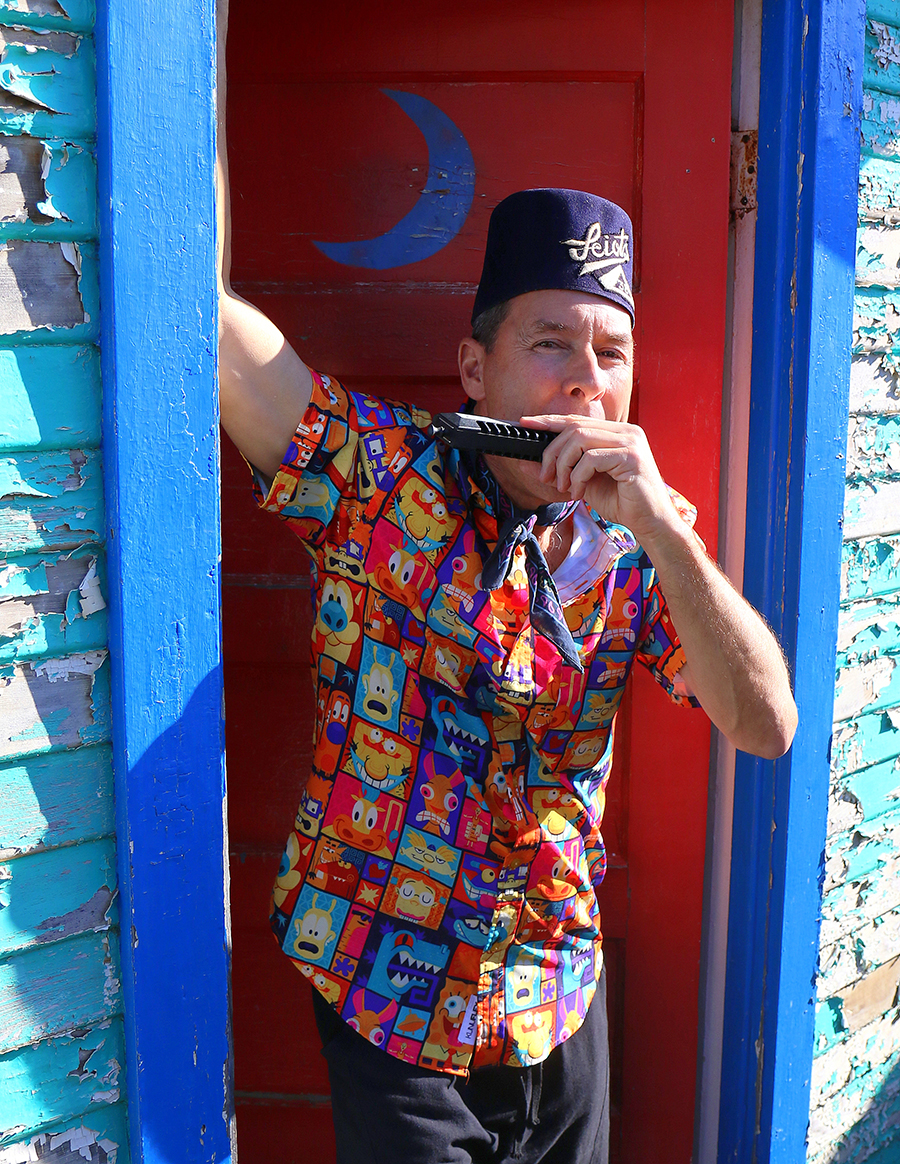
Photo by Dennis Anderssen.
When we started down this path, we were young guys in our early 20s. It was a great time for the blues! It seems the blues scene keeps getting older, and blues as we know and love it keeps getting further away from what drew us to it to begin with, while still calling it “blues.” But there are some young musicians locally who have had the torch passed to them and are serious about being musicians and carrying on the traditions of the blues like Justice Guevara, Reagan Williams, Steven Taylor, and Johnny Ramos. What advice do you have for these and other young players starting down this path?
BILLY: Keep playing as much as you can and try to find guys that jive with you. Take a lot of time to learn how to play, both the instrument and with other players. Learn etiquette, when and when not to ask if you can sit in. If I have a guy like Johnny Bazz on the gig, I’m not going to have him sit down so you can get up and play a song!
Another thing I’d tell these younger players is to learn a trade, so they can afford good gear and afford transportation to the gig and afford a place to live. Don’t pretend like you’re a rockstar at an early age. You have to have the ability to survive. Whatever it is, you have to have a side hustle, especially when things are the way they are.
And get a mentor. That’s what I did! (Scott: Billy always called me his “mentor and tor-mentor.” Ha ha!) James Harman was a mentor, and people didn’t take me seriously until I started working with Junior Watson. Then things changed quick. I started getting gigs in other cities like Long Beach, and started traveling more. Don’t hang out in one place because there aren’t enough gigs. You gotta spread out. Like Moe Howard from the Three Stooges says, “Spread out!” (Laughs)
I believe in that for everything. If you’re a carpenter you’re not going to just figure it out. Well, you may figure it out, but you’re going to lose a finger. You and Tom Essa in the Mudsharks were mentors to me and a lot of others. Thomas Yearsley of the Paladins has been a good mentor for Justice and Reagan. David “Kid” Ramos has been too, for Johhny and Steven. Mentors learned from guys who learned it and can pass it down to guys who are new to it. That’s just how it works.
SCOTT: After 30 years, what does the future hold for Billy Watson, both as a musician and otherwise?
BILLY: I’m going to be working here at Mitch’s until I’m 70! I would like to get back in the water more, but now there are sharks in the water; it’s unseasonably cold and it’s crowded. (Laughs) I’m going to keep plugging away and doing fun gigs.
SCOTT: If you had a musical genie, what would your three wishes be?
BILLY: Amps that don’t break down, harmonicas that don’t go out of tune, and…gigs that all make sense! That would be my magical genie. She’d have to look like Barbara Eden, and I’d have to make those wishes sitting inside of her bottle. (Laughs)


